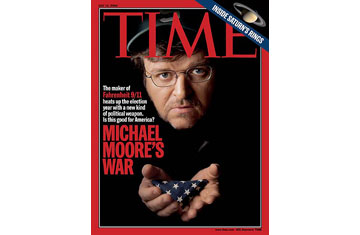
(4 of 7)
The first week's release no doubt attracted a higher proportion of its natural constituency, the liberal base. To become a blockbuster and a shaping force in the presidential campaign, Fahrenheit 9/11 will have to entice the curious, the hostile, the indifferent--just as a politician's toughest job is to reach the large number of nonvoters. Moore keeps saying that America is "a 50/50/50 country. There are those who vote, who seem to be evenly split, but then there's the 50% who don't vote, and no one pays attention to them." Moore does. He's doing what he does best--pestering--to get them into theaters. And then to the polls.
"I didn't have any of this so-called success until I was 35 years old with Roger & Me. Up until that point, I never made more than $15,000 a year. When you spend the first 17 years--in other words, half--of your adult life earning $15,000 or less, it really doesn't matter what kind of success you have after that. It's so ingrained in you."
His own life story would make a pretty cool movie. The son and nephew of GM factory workers, Moore was educated by nuns and Jesuits, and at 14 he briefly attended a seminary and had thoughts of becoming a priest. Eagle scout; expert hunter; good student. After disagreeing with a policy at his high school, he ran for the Davison County school board--and won, making him, at 18, one of the youngest elected officials in the nation.
Moore later dropped out of the University of Michigan at Flint and set up a crisis-intervention center. At 22 he joined, then edited, an alternative paper, The Flint Voice, while the industrial economy flailed and local jobs went overseas. "During the Reagan years we sat there in Flint and watched the Democratic Party cave in," he says, "watched the liberals be weak-kneed and wimpy and never stand up and fight for us. Liberals have failed us, the working people of this country."
His stern ideals and prickly temper shortened some of his work stints: as editor of the left magazine Mother Jones (a job that lasted less than a year) and author of Moore's Weekly, a newsletter that critiqued the media and was partly financed by Ralph Nader. Maybe only a tough man could make such confrontational comedies. He has won the allegiance of one tough man, Weinstein, who says, "Michael walks to his own beat. He has to when he wakes up every day and has a new death threat. I love the guy, and I'm not saying that 'Hollywood style.' I'm saying that for real."
Moore's debut film, 1989's Roger & Me, made for $250,000, was bought by Warner Bros. for $3 million. It earned nearly $7 million at the box office and introduced audiences to an improbable movie star: a shaggy, cagey doofus with a killer instinct for political and comic agitation.
Other filmmakers might have followed Roger & Me's success to Hollywood. Moore did direct one fiction comedy, Canadian Bacon, starring John Candy, but he realized that his true status was as the outsider banging down the doors of the insiders. He hatched a political show, TV Nation, which somehow managed to run at one time or another on NBC, Fox and Comedy Central. His 1997 film The Big One took a smart swipe at Big Business.
